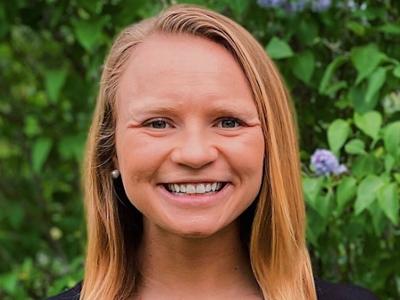STEM
STEM Blog
Graduate School Amidst a Pandemic
By Kristin Hughes '20
March 30, 2021

Tags STEM
When I arrived on the Hill back in 2016, I was an aspiring chemistry major who had given little thought to what I might do with my degree upon graduating. It was not until taking my first biochemistry course as a sophomore that I realized there was a specific area of the field that interested me. During the following two summers, I completed internships at The Jackson Laboratory and Pfizer, and each of these experiences highlighted that I wanted to pursue a biochemistry career in industry. At the commencement of my senior year, I began working on my thesis with Professor Max Majireck, to synthesize small drug-like molecules with the long-term goal of treating multiple myeloma. My research taught me that a role in drug design would be my ideal career choice, but how do I get there?
Throughout my last two years at Hamilton, I utilized the alumni directory religiously to reach out to former Hamilton chemistry majors. I spoke to Gabrielle Fleming ’14, Esther Cleary ‘15, Bryce Timn ’15, and Kathleen Kelly ’17 to inquire about what their career goals were, what immediate steps they took post-graduation and whether additional schooling was involved. What I concluded from these conversations, as well as from discussions with multiple scientists throughout my internships, was that a Ph.D. program was the best choice for me to move in the direction of an industry career in drug design. Keep in mind, I said this was the best choice for me (and it will be many years before I find out if this is true), but it is not for everyone. There are certainly other options including master’s programs, entry-level positions, and working at start-ups. Progress is not a straight line, nor does it look the same from person to person.
Just about one year ago to the day, I was traveling by plane, train, car, and subway through two train stations and three airports to attend accepted students’ days of various chemistry Ph.D. programs with no mask on and just a small travel-sized bottle of hand sanitizer in my pocket. I had no idea that I was missing my last weekend at Hamilton. From here, everything went to shambles, including my final graduate school visit to Boston University which was conducted via Zoom. Although it was the one school I did not get the chance to see in person, I knew it was the right fit for a number of factors. I was attracted to the size of the biochemistry division, the opportunity to rotate in different labs before making a decision, the welcoming environment of the faculty and students, as well as the location (which I did have to scope out using Google Maps street view). If you are contemplating graduate school, more specifically a Ph.D. program, these are some of the factors to consider both when applying and choosing a university.
Even though I am content with my selection, there are still some drawbacks about entering graduate school and beginning research during COVID times. For one, planning is everything -- including signing up for shifts to reserve instrument use and lab space, scheduling Zoom meetings with prospective PI’s, mentors, teaching supervisors, professors or undergraduate students, and juggling when and where you will be able to find an empty room to eat lunch with your mask off. I recommend keeping a detailed schedule with all of your Zoom links! Another tough transition has been that holidays no longer exist and there is no such thing as getting both a Saturday AND Sunday off. This is because labs are at 50% capacity, meaning half of the researchers work Sunday-Wednesday and the other half work Wednesday-Saturday. As a result, it is difficult to get to know all of the lab members when your rotation is only half of the week, but this is what Zoom meetings are for.
On the bright side, room capacities have been increasing and vaccination rates are rising. My class this semester is remote optional, meaning I have the opportunity to attend in person on campus if I choose to do so. I was also able to teach an undergraduate lab in person during the fall semester, and complete three four-week in-person lab rotations. For the classes that were held over Zoom, the class sizes are similar to those at Hamilton, so the professors know you by name and participation throughout class is encouraged.
Ultimately, the challenges the pandemic has imposed on graduate school life are not severe nor permanent. I am grateful for my Hamilton experiences which have guided me down this career path and if given the opportunity, I would not have done the past year differently.
